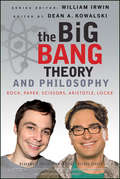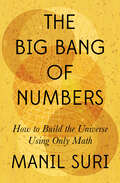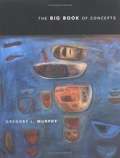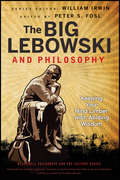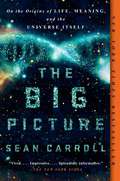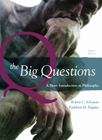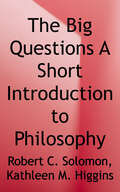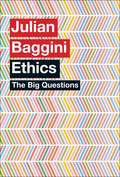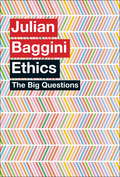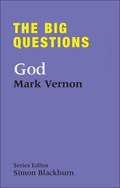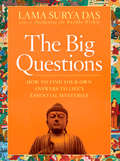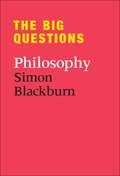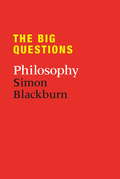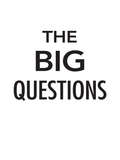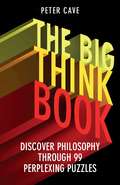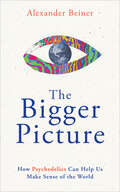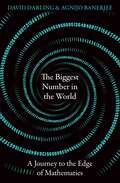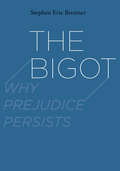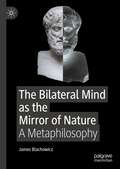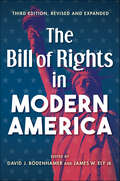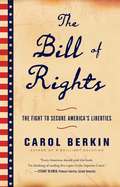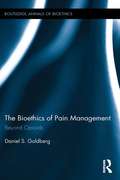- Table View
- List View
The Big Bang Theory and Philosophy
by William Irwin Dean KowalskiA lighthearted meditation on the philosophical quandaries of the hit television show The Big Bang TheoryEver wonder what Aristotle might say about the life Sheldon Cooper leads? Why Thomas Hobbes would applaud the roommate agreement? Who Immanuel Kant would treat with "haughty derision" for weaving "un-unravelable webs?" And-most importantly-whether Wil Wheaton is truly evil? Of course you have. Bazinga!This book mines the deep thinking of some of history's most potent philosophical minds to explore your most pressing questions about The Big Bang Theory and its nerdy genius characters. You might find other philosophy books on science and cosmology, but only this one refers to Darth Vader Force-chokes, cloning Leonard Nimoy, and oompa-loompa-like engineers. Fo-shizzle.Gives you irresistibly geek-worthy insights on your favorite Big Bang Theory characters, story lines, and ideasExamines important themes involving ethics and virtue, science, semiotics, religion, and the human conditionBrings the thinking of some of the world's greatest philosophers to bear on The Big Bang Theory, from Aristotle and Plato to Nietzsche, Wittgenstein, Simone de Beauvoir, and moreEssential reading for every Big Bang Theory fan, this book explores whether comic-book-wielding geeks can lead the good life, and whether they can know enough science to "tear the mask off nature and stare at the face of God."
The Big Bang of Numbers: How to Build the Universe Using Only Math
by Manil SuriAn engaging and imaginative tour through the fundamental mathematical concepts—from arithmetic to infinity—that form the building blocks of our universe. Our universe has multiple origin stories, from religious creation myths to the Big Bang of scientists. But if we leave those behind and start from nothing—no matter, no cosmos, not even empty space—could we create a universe using only math? Irreverent, richly illustrated, and boundlessly creative, The Big Bang of Numbers invites us to try. In this new mathematical origin story, mathematician and novelist Manil Suri creates a natural progression of ideas needed to design our world, starting with numbers and continuing through geometry, algebra, and beyond. He reveals the secret lives of real and imaginary numbers, teaches them to play abstract games with real-world applications, discovers unexpected patterns that connect humble lifeforms to enormous galaxies, and explores mathematical underpinnings for randomness and beauty. With evocative examples ranging from multidimensional crochet to the Mona Lisa’s asymmetrical smile, as well as ingenious storytelling that helps illuminate complex concepts like infinity and relativity, The Big Bang of Numbers charts a playful, inventive course to existence. Mathematics, Suri shows, might best be understood not as something we invent to explain Nature, but as the source of all creation, whose directives Nature tries to obey as best she can. Offering both striking new perspectives for math aficionados and an accessible introduction for anyone daunted by calculation, The Big Bang of Numbers proves that we can all fall in love with math.
The Big Book Of Concepts
by Gregory L. MurphyConcepts embody our knowledge of the kinds of things there are in the world. Tying our past experiences to our present interactions with the environment, they enable us to recognize and understand new objects and events. Concepts are also relevant to understanding domains such as social situations, personality types, and even artistic styles. Yet like other phenomenologically simple cognitive processes such as walking or understanding speech, concept formation and use are maddeningly complex. Research since the 1970s and the decline of the "classical view" of concepts have greatly illuminated the psychology of concepts. But persistent theoretical disputes have sometimes obscured this progress. The Big Book of Concepts goes beyond those disputes to reveal the advances that have been made, focusing on the major empirical discoveries. By reviewing and evaluating research on diverse topics such as category learning, word meaning, conceptual development in infants and children, and the basic level of categorization, the book develops a much broader range of criteria than is usual for evaluating theories of concepts.
The Big Lebowski and Philosophy
by Peter S. FoslCelebrate the Dude with an abiding look at the philosophy behind The Big Lebowski Is the Dude a bowling-loving stoner or a philosophical genius living the good life? Naturally, it's the latter, and The Big Lebowski and Philosophy explains why. Enlisting the help of great thinkers like Plato and Nietzsche, the book explores the movie's hidden philosophical layers, cultural reflection, and political commentary. It also answers key questions, including: The Dude abides, but is abiding a virtue? Is the Dude an Americanized version of the Taoist way of life? How does The Big Lebowski illustrate the Just War Theory? How does bowling help Donny, Walter, and the Dude oppose nihilism? Yes, the Dude is deep, and so is this book. Don't watch the movie-or go to Lebowski Fest-without it. Explores many of The Big Lebowski's key themes, such as nihilism, war and politics, money and materialism, idealism and morality, history, and more Gives you new perspective on the movie's characters-the Dude, the Big Lebowski, Walter Sobchak, Donny, Maude Lebowski, Bunny Lebowski, and others Helps you appreciate the Coen Brothers classic even more with the insights of Aristotle, Epicurus, Kant, Derrida, and other philosophical heavyweights
The Big No (21st Century Studies)
by Kennan FergusonWhat it means to celebrate the potential and the power of no What does it mean to refuse? To not participate, to not build a better world, to not come up with a plan? To just say &“no&”? Against the ubiquitous demands for positive solutions, action-oriented policies, and optimistic compromises, The Big No refuses to play. Here leading scholars traverse the wide range of political action when &“no&” is in the picture, analyzing topics such as collective action, antisocialism, empirical science, the negative and the affirmative in Deleuze and Derrida, the &“real&” and the &“clone,&” Native sovereignty, and Afropessimism.In his introduction, Kennan Ferguson sums up the concept of the &“Big No,&” arguing for its political importance. Whatever its form—he identifies various strains—the Big No offers power against systems of oppression. Joshua Clover argues for the importance of Marx and Fanon in understanding how people are alienated and subjugated. Theodore Martin explores the attractions of antisociality in literature and life, citing such novelists as Patricia Highsmith and Richard Wright. François Laruelle differentiates nonphilosophy from other forms of French critical theory. Katerina Kolozova applies this insight to the nature of reality itself, arguing that the confusion of thought and reality leads to manipulation, automation, and alienation. Using poetry and autobiography, Frank Wilderson shows how Black people—their bodies and being—are displaced in politics, replaced and erased by the subjectivities of violence, suffering, and absence. Andrew Culp connects these themes of negativity, comparing and contrasting the refusals of antiphilosophy and Afropessimism. Thinking critically usually demands alternatives: how would you fix things? But, as The Big No shows, being absolutely critical—declining the demands of world-building—is one necessary response to wrong, to evil. It serves as a powerful reminder that the presumption of political action is always positive.Contributors: Joshua Clover, U of California Davis and U of Copenhagen; Andrew Culp, California Institute of the Arts; Katerina Kolozova, Institute of Social Sciences and Humanities Skopje; Theodore Martin, U of California, Irvine; Anthony Paul Smith, La Salle U; Frank B. Wilderson III, U of California, Irvine.
The Big Picture: On the Origins of Life, Meaning, and the Universe Itself
by Sean Carroll<P>Already internationally acclaimed for his elegant, lucid writing on the most challenging notions in modern physics, Sean Carroll is emerging as one of the greatest humanist thinkers of his generation as he brings his extraordinary intellect to bear not only on Higgs bosons and extra dimensions but now also on our deepest personal questions. <P>Where are we? Who are we? Are our emotions, our beliefs, and our hopes and dreams ultimately meaningless out there in the void? Does human purpose and meaning fit into a scientific worldview? <P>In short chapters filled with intriguing historical anecdotes, personal asides, and rigorous exposition, readers learn the difference between how the world works at the quantum level, the cosmic level, and the human level--and then how each connects to the other. <P>Carroll's presentation of the principles that have guided the scientific revolution from Darwin and Einstein to the origins of life, consciousness, and the universe is dazzlingly unique. Carroll shows how an avalanche of discoveries in the past few hundred years has changed our world and what really matters to us. <P>Our lives are dwarfed like never before by the immensity of space and time, but they are redeemed by our capacity to comprehend it and give it meaning. <P>The Big Picture is an unprecedented scientific worldview, a tour de force that will sit on shelves alongside the works of Stephen Hawking, Carl Sagan, Daniel Dennett, and E. O. Wilson for years to come. <P><b>A New York Times Bestseller</b>
The Big Questions: A Short Introduction To Philosophy (Eighth Edition)
by Robert C. Solomon Kathleen M. HigginsWritten by well-known and respected philosophy teachers Robert C. Solomon and Kathleen Higgins, this best-selling introduction to philosophy is student-friendly in style and organization. This engaging text covers philosophy's central topics through an exploration of timeless big questions such as the meaning of life, God, and morality, giving students of all backgrounds and interest levels an appealing, relevant context to approach the course material and explore their own ideas and opinions. The writing style is concise and accessible, coverage is comprehensive without being intimidating, and each chapter's discussion is self-contained, making it easy for instructors to choose their preferred topics and presentation order.
The Big Questions: A Short Introduction to Philosophy
by Robert C. Solomon Kathleen M. HigginsThis book covers philosophy's central ideas in an accessible, approachable manner. You'll explore timeless "big questions" about the self, God, justice, and other meaningful topics, gaining the context you need for an understanding of the foundational issues, as well as the confidence to establish your own informed positions on these "big questions." <p><p>This edition is now also available with MindTap Philosophy, a system of tools and apps -- from note taking to flashcards -- that help you understand course concepts, achieve better grades, and set the groundwork for your future courses.
The Big Questions: Ethics
by Julian Baggini'The Big Questions' series is designed to let renowned experts confront the 20 most fundamental and frequently asked questions of a major branch of science or philosophy. In 'The Big Questions: Ethics' Julian Baggini, one of Britain's best-known philosophers, condenses complex, contemporary issues of right and wrong into 20 key questions. He examines how we can start to answer them, what they might mean to us and how they influence the way we choose to live our lives. Among the ideas debated are: What is free will? Can it ever be right to kill? Is terrorism ever justified? Should euthanasia be legal? Are some people superior to others? Do animals have rights?
The Big Questions: Ethics
by Julian Baggini'The Big Questions' series is designed to let renowned experts confront the 20 most fundamental and frequently asked questions of a major branch of science or philosophy. In 'The Big Questions: Ethics' Julian Baggini, one of Britain's best-known philosophers, condenses complex, contemporary issues of right and wrong into 20 key questions. He examines how we can start to answer them, what they might mean to us and how they influence the way we choose to live our lives. Among the ideas debated are: What is free will? Can it ever be right to kill? Is terrorism ever justified? Should euthanasia be legal? Are some people superior to others? Do animals have rights?
The Big Questions: Ethics (The Big Questions)
by Julian Baggini'The Big Questions' series is designed to let renowned experts confront the 20 most fundamental and frequently asked questions of a major branch of science or philosophy. In 'The Big Questions: Ethics' Julian Baggini, one of Britain's best-known philosophers, condenses complex, contemporary issues of right and wrong into 20 key questions. He examines how we can start to answer them, what they might mean to us and how they influence the way we choose to live our lives. Among the ideas debated are: What is free will? Can it ever be right to kill? Is terrorism ever justified? Should euthanasia be legal? Are some people superior to others? Do animals have rights?
The Big Questions: God
by Mark VernonEasy, enlightening and mind-stretching, here are answers to the 20 biggest questions of religion and its attempts to give meaning to our world.The Big Questions series is designed to let renowned experts address the 20 most fundamental and frequently asked questions of a major branch of science or philosophy. Each 3000-word essay simply and concisely examines a question that has eternally perplexed enquiring minds, and provides answers based on the latest research. This ambitious project is a unique distillation of humanity's best ideas. In The Big Questions: God, Mark Vernon answers the 20 key questions:Can reason prove the existence of God? Will science bring the end of religion? Why do people still have religious beliefs? Is religion a mistake of evolution? Can drugs induce religious experiences? Can you be spiritual without being religious? Have you seen a miracle? What is the literal meaning of Scripture? If you're not religious, is nothing sacred? Can an agnostic pray? Is religion inherently violent? What is it like to be a fundamentalist? What is Buddhist enlightenment? Is Confucianism a religion? Is nature divine? Is there a perennial philosophy? Does human suffering rule out God? Can we be good without God? Are we living in the end times? Is there life after death?
The Big Questions: How to Find Your Own Answers to Life's Essential Mysteries
by Lama Surya DasThe best-selling author of Awakening the Buddha Within addresses life's most provocative and tantalizing questions simply, directly, and powerfully.Every life is a journey through the unknown. Along the way, however, we tend to encounter the same perplexing questions again and again. Some are cosmic enigmas that have always tested the human mind: What is my purpose in life? What happens after I die? Others are puzzles presented by daily life in modern society: What, if anything, justifies assisted suicide? What is my personal responsibility to the homeless? According to Lama Surya Das, one of the foremost Western Buddhist scholars and teachers, the more we seek to resolve these mysteries, the more fully we live.Along with his own personal beliefs, the author presents a variety of thoughtful points of view representing different schools of Buddhism, other religions, spirituality in general, and pragmatism. The Big Questions challenges readers in the most stimulating and thoughtful way to formulate individual, authentic responses to life's big questions.
The Big Questions: Philosophy
by Simon BlackburnBestselling author Simon Blackburn tackles the key questions in philosophy--and provides easy-to-understand and enlightening answers.In Big Questions: Philosophy, bestselling author Simon Blackburn addresses the 20 essential questions:What is the meaning of life? Am I free? Why is there something and not nothing? What do we really know? Is there such a thing as society? Can machines think? What is time? How can I deceive myself? Why be good? What fills up space? Can we truly understand each other? Why do things keep on keeping on? Are we rational? What am I? What are my rights? Is truth relative? Do we need God? What is human nature? What is beauty? Is death to be feared?
The Big Questions: Philosophy
by Simon BlackburnThe Big Questions series is designed to let renowned experts confront the 20 most fundamental and frequently asked questions of a major branch of science or philosophy. Each 3000-word essay simply and concisely examines a question that has eternally perplexed enquiring minds, and provides answers from history's great thinkers. This ambitious project is a unique distillation of humanity's best ideas. In Big Questions: Philosophy, bestselling author Simon Blackburn addresses 20 essential questions.
The Big Questions: Philosophy
by Simon BlackburnThe Big Questions series is designed to let renowned experts confront the 20 most fundamental and frequently asked questions of a major branch of science or philosophy. Each 3000-word essay simply and concisely examines a question that has eternally perplexed enquiring minds, and provides answers from history's great thinkers. This ambitious project is a unique distillation of humanity's best ideas. In Big Questions: Philosophy, bestselling author Simon Blackburn addresses 20 essential questions.
The Big Questions: Tackling the Problems of Philosophy with Ideas from Mathematics, Economics and Physics
by Steven E. LandsburgIn the wake of his enormously popular books The Armchair Economist and More Sex Is Safer Sex, Steven Landsburg uses concepts from mathematics, economics, and physics to address the big questions in philosophy: What is real? What can we know? What is the difference between right and wrong? And how should we live? Widely renowned for his lively explorations of economics, in his fourth book Landsburg branches out into mathematics and physics as well—disciplines that, like economics, the author loves for their beauty, their logical clarity, and their profound and indisputable truth—to take us on a provocative and utterly entertaining journey through the questions that have preoccupied philosophers through the ages. The author begins with the broadest possible categories—Reality and Unreality; Knowledge and Belief; Right and Wrong—and then focuses his exploration on specific concerns: from a mathematical analysis of the arguments for the existence of God; to the real meaning of the Heisenberg Uncertainty Principle and the Godel Incompleteness Theorem; to the moral choices we face in the marketplace and the voting booth. Stimulating, illuminating, and always surprising, The Big Questions challenges readers to re-evaluate their most fundamental beliefs and reveals the relationship between the loftiest philosophical quests and our everyday lives.
The Big Think Book: Discover Philosophy Through 99 Perplexing Problems
by Peter CavePeter Cave's bestselling trio of humorous philosophy titles - What's Wrong With Eating People?, Can a Robot be Human?, and Do Llamas Fall in Love? - brought together in one big book.What makes me, me - and you, you?What is this thing called 'love'? Does life have a point?Is 'no' the right answer to this question?Philosophy transports us from the wonderful to the weird, from the funny to the very serious indeed. With the aid of tall stories, jokes, fascinating insights and common sense, Peter Cave offers a comprehensive survey of all areas of philosophy, addressing the big puzzles in ethics and politics, metaphysics and knowledge, religion and the emotions, aesthetics and logic. Replete with a smorgasbord of amusing and mind-boggling examples, The Big Think Book is perfect for anyone who delights in life's conundrums.
The Bigger Picture: How Psychedelics Can Help Us Make Sense of the World
by Alexander BeinerCan psychedelic drugs help us tackle the biggest problems we face globally? Can they heal the cultural, spiritual, and political wounds we&’re wrestling with?Psychedelics have hit the mainstream as powerful new mental health treatments. But as clinicians explore what these molecules can do for our individual minds, The Bigger Picture goes further to illuminate how psychedelics can help us find new ways to make sense of and come through the crises we face around the world.Drawing on the latest research, as well as his unique experience as a participant in a ground-breaking clinical trial investigating the potent psychedelic DMT, Alexander Beiner reveals:the role of psychedelics in addressing global issues such as global warming, geopolitical instability, and political polarization the dark side of the &‘psychedelic renaissance&’ and &‘psychedelic capitalism&’what it takes to elicit huge personal and cultural transformation through psychedelicsEmbark on a journey into The Bigger Picture – a new era of science and spirituality with the potential to radically transform our perceptions of ourselves, one another, and our life on this planet.
The Biggest Number in the World: A Journey to the Edge of Mathematics
by David Darling Agnijo BanerjeeFrom cells in our bodies to measuring the universe, big numbers are everywhere We all know that numbers go on forever, that you could spend your life counting and never reach the end of the line, so there can&’t be such a thing as a &‘biggest number&’. Or can there? To find out, David Darling and Agnijo Banerjee embark on an epic quest, revealing the answers to questions like: are there more grains of sand on Earth or stars in the universe? Is there enough paper on Earth to write out the digits of a googolplex? And what is a googolplex? Then things get serious. Enter the strange realm between the finite and the infinite, and float through a universe where the rules we cling to no longer apply. Encounter the highest number computable and infinite kinds of infinity. At every turn, a cast of wild and wonderful characters threatens the status quo with their ideas, and each time the numbers get larger.
The Bigot
by Stephen Eric BronnerStephen Eric Bronner is a prolific author, activist, and one of America's leading political thinkers. His new book presents bigotry as a systematic, all-encompassing mindset that has a special affinity for right-wing movements. In what will surely prove a seminal study, Bronner explores its appeal, the self-image it justifies, the interests it serves, and its complex connection with modernity. He reveals how prejudice shapes the conspiratorial and paranoid worldview of the true believer, the elitist, and the chauvinist. In the process, it becomes apparent how the bigot hides behind mainstream conservative labels in order to support policies designed to disadvantage the targets of his contempt. Examining bigotry in its various dimensions--anthropological, historical, psychological, sociological, and political--Professor Bronner illustrates how the bigot's intense hatred of "the other" is a direct reaction to social progress, liberal values, secularism, and an increasingly complex and diverse world. A sobering look at the bigot in the twenty-first century, this volume is essential for making sense of the dangers facing democracy now and in the future.
The Bilateral Mind as the Mirror of Nature: A Metaphilosophy
by James BlachowiczThis book provides a framework that encompasses both physics and cognitive science – integrating them into a ‘theory of everything’ to establish a basis for both our scientific and humanistic endeavours.It explores the implications of brain laterality for understanding the emergence of mind and its relation to the physical world – arguing that the analytic vs. holistic cognitive differences of the left and right human cerebral hemispheres are key to understanding not only human self-consciousness and language, but also sociocultural phenomena ranging from the emergence of the scientific method and axes of political orientation to the direction of development of conceptions of God and the fundamental differences between polarizing philosophical traditions.In a further step, the book draws on the Darwinian principle that our cognitive apparatus is shaped by the environment in which it evolved to argue that human bilaterality mirrors the fundamental hylomorphic relation between formal organization and material components that constitutes physical nature itself. The logical division between holistic and analytic categories thereby offers a principled basis for a metaphilosophy.
The Bill of Rights in Modern America: Third Edition, Revised And Expanded
by David J. Bodenhamer and James W. ElyAs the 2020s began, protestors filled the streets, politicians clashed over how to respond to a global pandemic, and new scrutiny was placed on what rights US citizens should be afforded. Newly revised and expanded to address immigration, gay rights, privacy rights, affirmative action, and more, The Bill of Rights in Modern America provides clear insights into the issues currently shaping the United States. Essays explore the law and history behind contentious debates over such topics as gun rights, limits on the powers of law enforcement, the death penalty, abortion, and states' rights. Accessible and easy to read, the discerning research offered in The Bill of Rights in Modern America will help inform critical discussions for years to come.
The Bill of Rights: The Fight to Secure America's Liberties
by Carol BerkinThe real story of how the Bill of Rights came to be: a concise, vivid history of political strategy, big egos, and partisan interest that set the terms of the ongoing contest between the federal government and the states.Revered today for articulating America's founding principles, the first ten amendments--the Bill of Rights--was in fact a political stratagem executed by James Madison to preserve the Constitution, the Federal government, and the latter's authority over the states. In the skilled hands of award-winning historian Carol Berkin, the story of the Founders' fight over the Bill of Rights comes alive in a gripping drama of partisan politics, acrimonious debate, and manipulated procedure. From this familiar story of a Congress at loggerheads, an important truth emerges. In 1789, the young nation faced a great ideological divide around a question still unanswered today: should broad power and authority reside in the federal government or should it reside in state governments? The Bill of Rights, from protecting religious freedom and the people's right to bear arms to reserving unenumerated rights to the states, was a political ploy first, and matter of principle second. How and why Madison came to devise this plan, the divisive debates it fostered in the Congress, and its ultimate success in defeating antifederalist counterplans to severely restrict the powers of the federal government is more engrossing than any of the myths that shroud our national beginnings. The debate over the founding fathers' original intent still continues through myriad Supreme Court decisions. By pulling back the curtain on the political, short-sighted, and self-interested intentions of the founding fathers in passing the Bill of Rights, Berkin reveals the inherent weakness in these arguments and what it means for our country today.
The Bioethics of Pain Management: Beyond Opioids (Routledge Annals of Bioethics)
by Daniel S. GoldbergIn this book, public health ethicist Daniel S. Goldberg sets out to characterize the subjective experience of pain and its undertreatment within the US medical establishment, and puts forward public policy recommendations for ameliorating the undertreatment of pain. The book begins from the position that the overwhelming focus on opioid analgesics as a means for improving the undertreatment of pain is flawed, and argues instead that dominant Western models of biomedicine and objectivity delegitimize subjective knowledge of the body and pain in the US. This general intolerance for the subjectivity of pain is part of a specific American culture of pain in which a variety of actors take part, including not only physicians and health care providers, but also pain sufferers, caregivers, and policymakers. Concentrating primarily on bioethics, history, and public policy, the book brings a truly interdisciplinary approach to an urgent practical ethical problem. Taking up the practical challenge, the book culminates in a series of policy recommendations that provide pathways for moral agents to move beyond contests over drug policy to policy arenas that, based on the evidence, hold more promise in their capacity to address the devastating and inequitable undertreatment of pain in the US.
